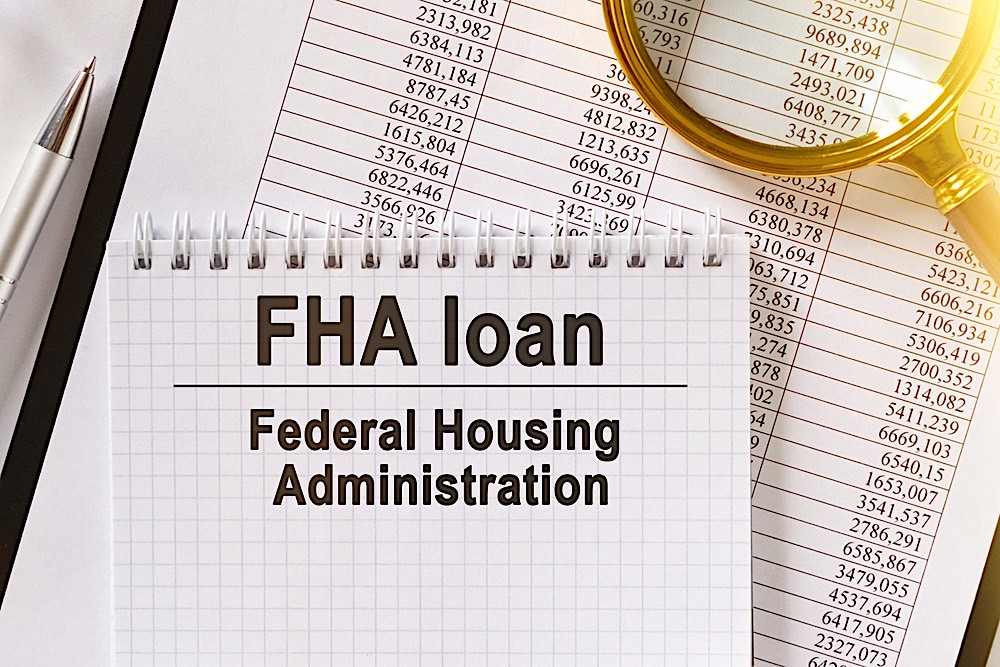Are you thinking about buying a house? There are two types of mortgage loans that are popular for financing residential properties: the FHA loan and the conventional loan.
There’s a common misconception that the FHA loan is only suitable for first-time homebuyers, while the conventional loan is better for homeowners. But you can actually benefit from either of them. It all depends on your financial situation and your investment goals.
Let’s compare FHA vs. conventional mortgage loans.

What is an FHA Loan?
An FHA loan is a mortgage loan that’s secured by the Federal Housing Administration of the U.S. Government.
The Federal Housing Administration was created in 1934 to provide affordable mortgage loans to people with low or moderate incomes and first-time homebuyers.
The FHA provides mortgage insurance on the loan, so the lender will be protected from losses if the loan defaults. That incentivizes lenders to offer mortgage loans to people who may not have a substantial credit history.
Nowadays, the FHA loan is commonly seen as a mortgage that’s only sought by first-time homebuyers. But that’s not entirely accurate. FHA loans can be used to finance:
-
Single-family homes
-
Multi-family homes (up to four units)
-
Condominiums
-
Some types of manufactured/mobile homes
In some cases, an FHA loan can be used to finance home construction or home renovations.
[ Thinking about investing in real estate? Register to attend a FREE online real estate class and learn how to get started investing in real estate. ]
What is a Conventional Loan?
A conventional loan is a mortgage loan that’s not backed by a government agency. Conventional loans are offered and serviced by private lenders, such as banks, credit unions, and other financial institutions.
Since the government does not insure conventional loans, they’re riskier for lenders. Lenders often require stricter qualifications for conventional loans and may only offer them to borrowers with good credit and a strong financial profile.
FHA vs. Conventional Loan: Key Differences
What are the key differences between an FHA and a conventional loan?
Generally, FHA loans and conventional loans are insured in different ways, and they each have different qualification requirements.
There are key differences when it comes to:
-
Minimum down payments
-
Credit scores
-
Mortgage insurance
-
Debt-to-income ratios
-
Loan limits
-
Property standards
-
Refinancing
Let’s break down each one.
Minimum Down Payment
FHA loans have a minimum down payment of 3.5%, so long as you have a credit score of 580 or higher.
While you can find some conventional loans that allow a 3% down payment, these loans are usually reserved for homebuyers with very high credit scores and well-stocked savings accounts. Most conventional loans require a down payment anywhere from 3% to 20%, but you’ll be required to pay for mortgage insurance if your down payment is less than 20% (more on that later).
First-time homebuyers often seek out FHA loans because of the low minimum down payment. When you already own a house, it’s easier to buy a second house because you can just sell your existing house and use the cash to make the down payment on the second.
You won’t have that option if you’re a first-time homebuyer, so you might find a 3.5% down payment much more affordable than the 20% down payment that’s required by many conventional loans.
FHA loans are also popular with homebuyers who have low and moderate incomes. These buyers may not be earning enough money to save for a 20% down payment in a reasonable amount of time.
FHA loans are becoming increasingly popular with millennials—the generation that’s been most impacted by rising housing costs.
Is It Better to Have a Low or High Down Payment?
Is it better to have a low or high down payment? It depends entirely on your financial situation.
If your down payment is low, your monthly mortgage payment is going to be higher compared to a conventional loan. Even if you can afford a 3.5% down payment, you’ll need to be earning enough money to cover the higher monthly payments.
Conventional loans are the opposite: the down payment is higher, but the monthly mortgage payments are lower. Conventional loans can be much more affordable for those who are earning less money.
Credit Scores
Generally, FHA loans are easier to qualify for. If you have a credit score of 580, you can make a down payment of 3.5%. If you have a credit score between 500 and 579, you’ll have to make a down payment of 10%.
Most conventional loans require a credit score of 620 or higher. But the lower your credit score, the higher your interest rates. If you want to earn the best interest rate, you should aim for a credit score of 680 or higher.
You might prefer an FHA loan if you have a lower credit score or if your credit history is short—in other words, you haven’t regularly used a credit card, or you’ve never received a loan.
If you have a higher credit score, you might prefer a conventional mortgage because you’re likely to get better rates.

Mortgage Insurance
Although FHA loans are secured by the federal government, you still have to pay for mortgage insurance.
FHA insurance premiums cost the same amount, no matter what your credit score. You’ll have to pay an upfront cost of 1.75% of the entire loan and then make recurring payments that vary depending on the size of your down payment.
Conventional loans may or may not require private mortgage insurance. If you have a lower credit score, your mortgage insurance will probably cost more; with a higher credit score, it will cost less.
On an FHA loan, you’ll have to pay for mortgage insurance throughout the entire life of your loan unless you make a down payment of 10% or more.
On a conventional loan, private mortgage insurance automatically ends once you’ve acquired 78% equity in the property.
Debt-to-Income Ratios
Your debt-to-income ratio (DTI) is the percentage of income you use to pay for your debts (which include mortgage loans, student loans, auto loans, child support, and credit card payments).
When your DTI is high, you probably will have greater difficulty making your mortgage payments. When your DTI is low, your payments will likely be less challenging for you.
To qualify for an FHA loan, your debt-to-income ratio must be 50% or less.
Conventional loans sometimes allow for a DTI of 50%, but most require 43% or less.
Loan Limits
Both FHA loans and conventional loans limit how much you can borrow.
FHA loans limit you to:
-
$356,362 in low-cost areas (as of 2021)
-
$822,375 in expensive markets (as of 2021)
Conventional loans limit you to $548,250. Conventional loans that are higher than that are called “jumbo loans” and are technically a different kind of mortgage product.
Property Standards
When comparing FHA vs. conventional loans, you’ll have to take property condition and “intended use” into account.
FHA appraisals are much more intensive than conventional loan appraisals. When you apply for an FHA loan, the property you intend to buy will be thoroughly assessed for safety and building code adherence. It’s hard to buy a “fix-me-up” with an FHA loan.
FHA loans may also not be a good option for real estate investors because they can’t be used as a rental property. When you buy a house with an FHA loan, it must be used as your primary residence.
On the other hand, a conventional loan can be used to buy a rental home, vacation home, or primary residence.
Refinancing
You can refinance both FHA and conventional loans.
FHA loans are easier to refinance because there’s no credit check, income verification, or home appraisal. If you made a down payment of at least 10%, you can also end your mortgage insurance payments by refinancing.
Should I Choose an FHA or Conventional Loan?
What’s better: an FHA or conventional loan?
It all depends on your financial situation: your income, savings, credit score, and financial goals.
You might prefer an FHA loan if:
-
You have a short credit history or low credit score
-
You’re not earning enough money to make a higher down payment
-
You haven’t saved enough money for a higher down payment, and you want to purchase a home within a year or two
-
You’re earning enough money to afford higher mortgage payments, but you haven’t saved enough for a higher down payment

You might prefer a conventional loan if:
-
You’re a real estate investor and want to purchase an investment property
-
You want to buy a second home/vacation home
-
You’ve saved enough money to make a higher down payment
-
You have a high credit score
-
You want your mortgage payments to be lower
It’s helpful to explore both FHA and conventional loans so you can compare their costs. If you’re thinking about getting a conventional loan, shop for loans among different lenders and find the one that has the best rates and terms.
Summary
What are the key differences between FHA vs. conventional loans? FHA loans are secured by the federal government, and you can qualify with lower minimum down payments and lower credit scores. With an FHA loan, you’ll have to pay mortgage insurance and you’ll likely have higher monthly mortgage payments. Conventional loans are not secured by a government agency. They typically require a higher down payment and higher credit scores, but they may come with better interest rates and lower monthly mortgage payments. Conventional loans are better for real estate investors because they can finance investment properties and vacation homes—FHA loans will not.
Ready to start taking advantage of the current opportunities in the real estate market?
Click the banner below to take a 90-minute online training class and get started learning how to invest in today’s real estate market!
The information presented is not intended to be used as the sole basis of any investment decisions, nor should it be construed as advice designed to meet the investment needs of any particular investor. Nothing provided shall constitute financial, tax, legal, or accounting advice or individually tailored investment advice. This information is for educational purposes only.


